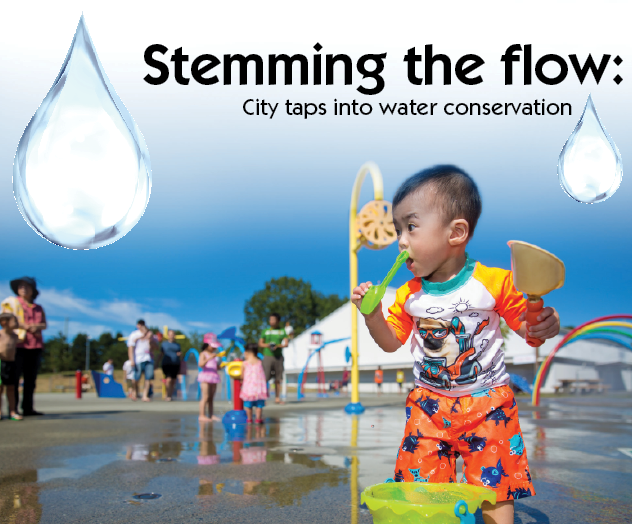At the Cranberry Children’s Centre in the Hamilton neighbourhood of east Richmond, youngsters Chloe, three, and Caden, five, have become some of Richmond’s first Stage 3 water restriction experts, by using rain barrel water and pint-sized watering cans to hydrate their vegetable garden and apple trees.
On either end of its garden the centre has two, 200-litre water barrels that collect storm water from the roof; but those barrels are nearly empty these days.
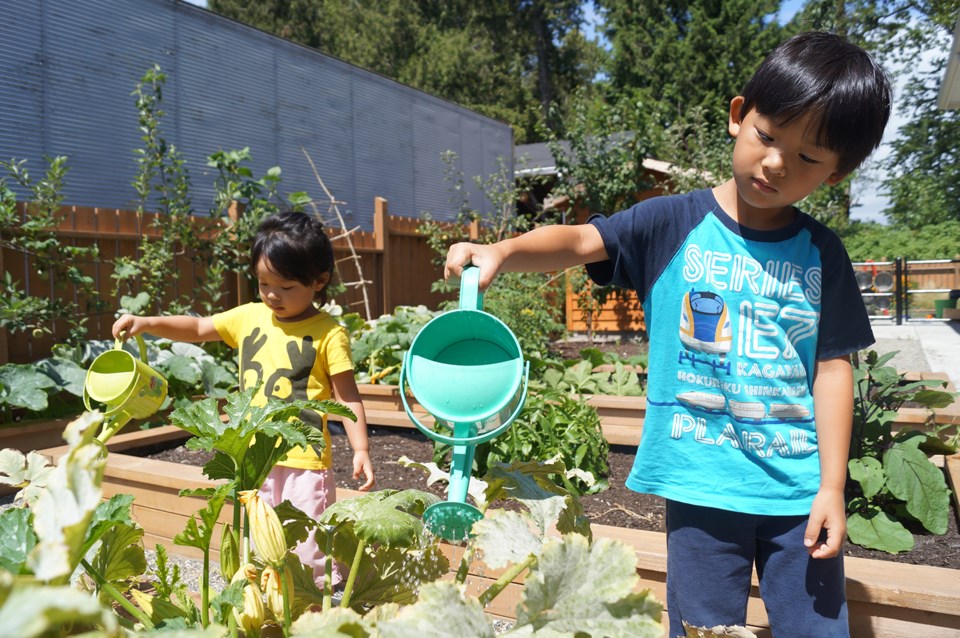
That’s because as productive and useful as the barrels may be during normal summers, Richmond (Vancouver International Airport) has seen just 16.6 millimetres of rain since May 1. The average rainfall for May through July is 154 millimetres, normally enough to keep the barrels relatively full.
From the start of the year until the end of April, the city experienced nearly the exact average of precipitation (six millimetres more), but water experts from regional government Metro Vancouver have noted much of the precipitation at higher elevations came in the form of rain, meaning snow packs surrounding the watersheds have been far below average.
As a result the region is in its first Stage 3 water restriction since 2003.
That means Chloe and Caden’s zucchinis, apples and tomatoes are now at risk of drying up if the region doesn’t soon experience significant rainfall. Right now, at Stage 3 restrictions, which went into full effect on Monday, the 35 or so children at the centre can still water their garden, flowers and trees with watering cans or a hose with a spring-loaded shut-off nozzle (soaker hoses and sprinklers are prohibited). However, any watering would be prohibited at Stage 4 if and when draconian measures would be put in place for the first time since 1997.
Richmond gets its supply of water from three reservoirs — Seymour, Capilano and Coquitlam — located on the North Shore Mountains. As of July 19 the capacity was at 69 per cent, according to officials who note the total volume is about where it would normally be in late August. In total the region has a potential of 195 billion litres of water available and has already tapped into its alpine lakes.
In the last week, Metro Vancouver’s 2.4 million residents have been using about 1.4 to 1.6 billion litres of water per day. Richmond accounts for about 116 million litres of water consumption per day, according to the city’s most recent weekly count on July 16, putting the city about on par with its consumption per capita.
“Collectively, we need to reduce consumption below 1.2 billion litres per day, and if everyone does their part, we’ll make that happen,” Metro Vancouver Chair Greg Moore told media Monday.
Ted DeCrom, Richmond’s manager of parks operations, says residents can expect to see wilting flowers in the city’s boulevards as he claims the city is taking steps above and beyond what Metro Vancouver officials are asking of municipalities.
“You’ll see the flowers deteriorate and eventually we’ll pull them out,” said DeCrom.
Meanwhile, the city has been reclaiming flushed water and put it in tanker trucks to send to the works yard where the water is then distributed to smaller trucks for hand watering of trees, particularly juvenile ones.
DeCrom said water needs to be flushed regularly from the end points of the city’s 630-plus kilometre system of pipes in order to prevent material buildup and thus keep drinking water healthy.
City employees will be in water trucks with the reclaimed water working day and night. DeCrom said the staffing levels would be the same as other years as there is less need for employees to be cutting grass.
While a full watering ban will apply to all residential lawns, the city has 13 sand-based, natural grass sports fields that require constant watering, noted DeCrom.
“It’s pure sand. There’s no real topsoil, so there’s no ability to retain moisture. They’re built specially so water goes through them in the fall and winter months and they dry in the summer,” he said.
As such, residents may notice water sprinklers working midday on the sites (no time restrictions).
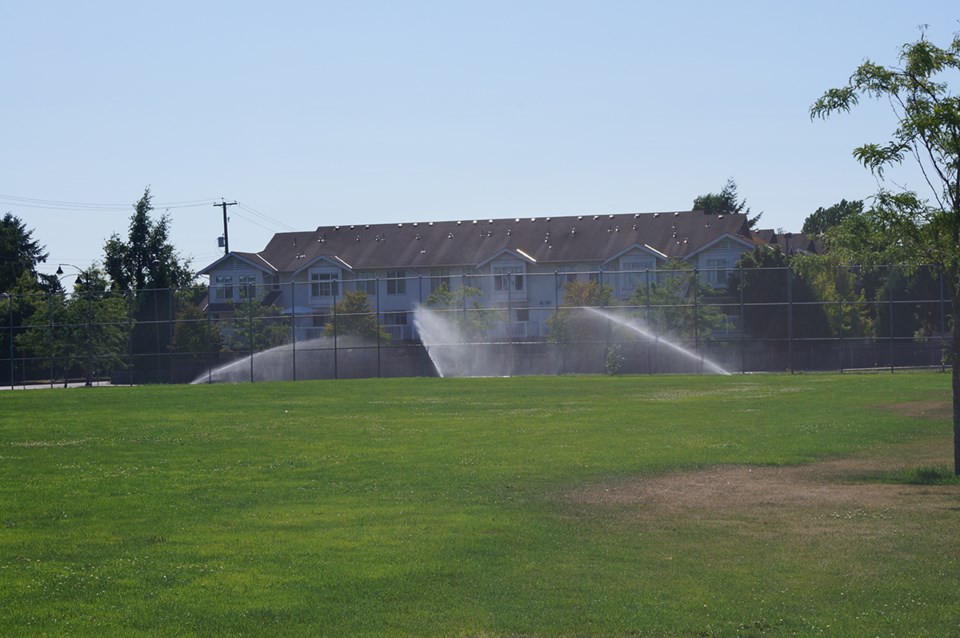
As for other fields, all watering will cease except under exceptional circumstances that are necessary for health and safety (such as washing away blood on an artificial turf field).
Meanwhile, the city has shut down two water parks, at Dixon elementary school and in Burkeville, however two others — those at Steveston and King George parks — will remain open during Stage 3 restrictions.
Both of the latter parks use push-button activated sprinklers and recycle the water that’s used. DeCrom said Steveston’s water park uses about 2,000 litres of water that’s continuously retreated and monitored. He couldn’t give an estimate on how much evaporates on any given sunny day. Notably, in Stage 3, municipalities can choose to keep water parks open.
DeCrom said he expects Minoru Park’s lower pond to dry out and city crews may have to relocate fish to the upper pond. He added the Garden City Park ponds are fed by well water, so that shouldn’t be an issue.
As well, outdoor pools in Steveston and South Arm will remain open, but the city will not be topping them up, according to director of public works Tom Stewart.
Another noticeable difference can be seen at Richmond City Hall where the reflecting ponds have gone bone dry.
Part of Stewart’s city-wide water conservation plan has long been in effect via a leak detection program, which includes city-mandated water meters that help detect leaks.
Stewart said the meters help people save money by allowing them to look at their quarterly water use and, in turn, use measures to conserve water.
The program is said to be working. From 2005 to 2007 the city consumed well in excess of 38 billion litres of water annually. Since 2008, and up to 2014 — a span in which Richmond grew by about 20,000 residents — the city has only reached 38 billion litres once, and just barely, in 2009. In addition to recent trends, per capita water use in Metro Vancouver is said to be down by about 23 per cent since 1993.
However, for those who are not conserving water during the restrictions, Stewart said the city would be vigilant in handing out violation tickets.
Since the Stage 2 restrictions came into effect Stewart said the city was more proactive on the education front, handing out brochures to homeowners who were sprinkling lawns outside of regulated hours.
Violation tickets start at $500 and offenders can face multiple fines for multiple infractions. In worse case scenarios someone could face a court-ordered penalty of $10,000. So far, the city has issued nine tickets this year and handed out 20 warnings.
“There’s not a lot of people violating (the restrictions), just a few. People may not be aware that the restrictions are happening and hopefully we’ve caught most of them; but I’m sure we’ll find some, said Stewart.
Among many of the restrictions to take place under Stage 3 is the prohibition of handwashing one’s car.
At Richmond Auto Wash on Bridgeport Road operations manager Ben Wang said he is preparing for more customers during the Stage 3 restrictions, as commercial car washes are still allowed to operate.
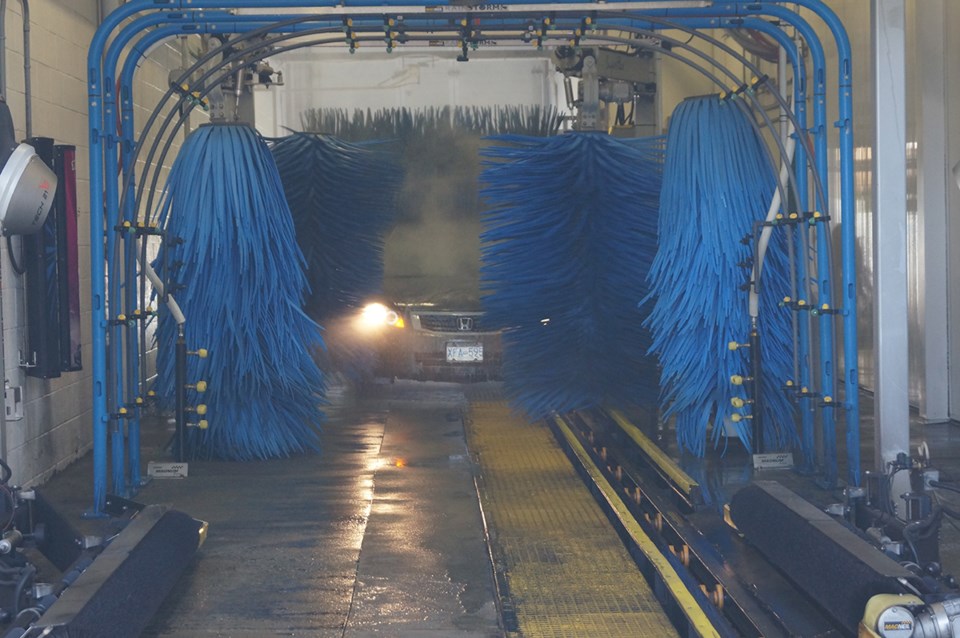
Wang said if one needs to wash one’s car his car wash makes environmental sense in many ways.
First, he noted the car wash uses about 100-130 litres of water per wash whereas he claims a typical wash at home may use 300-plus litres. Furthermore, his system separates chemicals and oils before they are flushed down the drain and it uses an eco-friendly car wax.
He said summertime is normally his busy season and during Stage 2 restrictions he saw a small bump in business.
Stewart said many car washes reclaim water as well and that’s why Metro Vancouver allows them to operate during such an apparent crisis.
Among some of the other main restrictions a typical resident will face is a prohibition on pressure washing for any aesthetic purposes, refilling hot tubs, pools or garden ponds, and cancelled watering exemptions for new or treated lawns.
Golfers will also feel the pinch as golf course managers may no longer water fairways and only water greens when absolutely necessary.
Richmond Country Club head pro Mark Strong said fairways will be hard and fast by the end of the summer, but it shouldn’t affect play too much.
In order to conserve water, City of Richmond spokesperson Kim Decker said there are many methods being promoted by the city beyond just not watering lawns, which accounts for about 40 per cent of water used by residents in single-family homes and 15 per cent by those in condos/apartments.
Decker notes the city’s website that states low-flow toilets can save up to 70 litres per day in a busy home; brooming a driveway instead of hosing it off saves about 300 litres; and running dishwashers and washing machines on full loads can save about 3,700 litres per month.
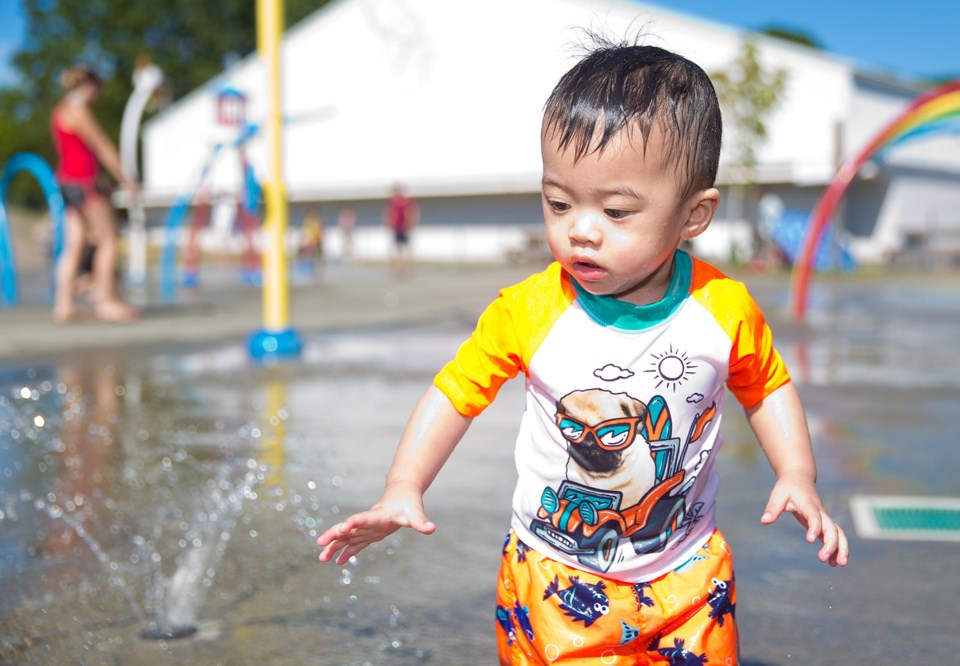
Prohibited water uses:
Any lawn watering
Trees, flowers and vegetables (with sprinklers)
Private pressure washing
Washing cars
Golf course fairways
Municipal parks
Ornamental fountains
Private swimming pools
Garden ponds
Permitted water uses:
Trees, flowers and vegetables (with shutoff hand nozzle or drip irrigation)
Commercial car washes
Commercial pressure washing (for safety or pre-paint treatment)
Hosing driveway for maintenance work (sealing)
Turf farms
Golf course greens
Sports playing fields (to permit useable conditions)
Municipal artificial turf (dust control)
What would Stage 4 mean?
No watering flowers or vegetables with treated water.
No watering of commercial flower and vegetable gardens with treated water.
All water parks and outdoor pools are closed.
All pressure washing and hosing unless authorized by a public health authority.
Commercial car washes are shut down.
Golf courses cannot use treated water at all.
All sports fields cannot use treated water.
